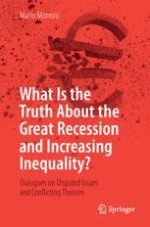2018 | OriginalPaper | Buchkapitel
Increasing Inequality
First Dialogue
verfasst von : Mario Morroni
Erschienen in: What Is the Truth About the Great Recession and Increasing Inequality?
Aktivieren Sie unsere intelligente Suche, um passende Fachinhalte oder Patente zu finden.
Wählen Sie Textabschnitte aus um mit Künstlicher Intelligenz passenden Patente zu finden. powered by
Markieren Sie Textabschnitte, um KI-gestützt weitere passende Inhalte zu finden. powered by
